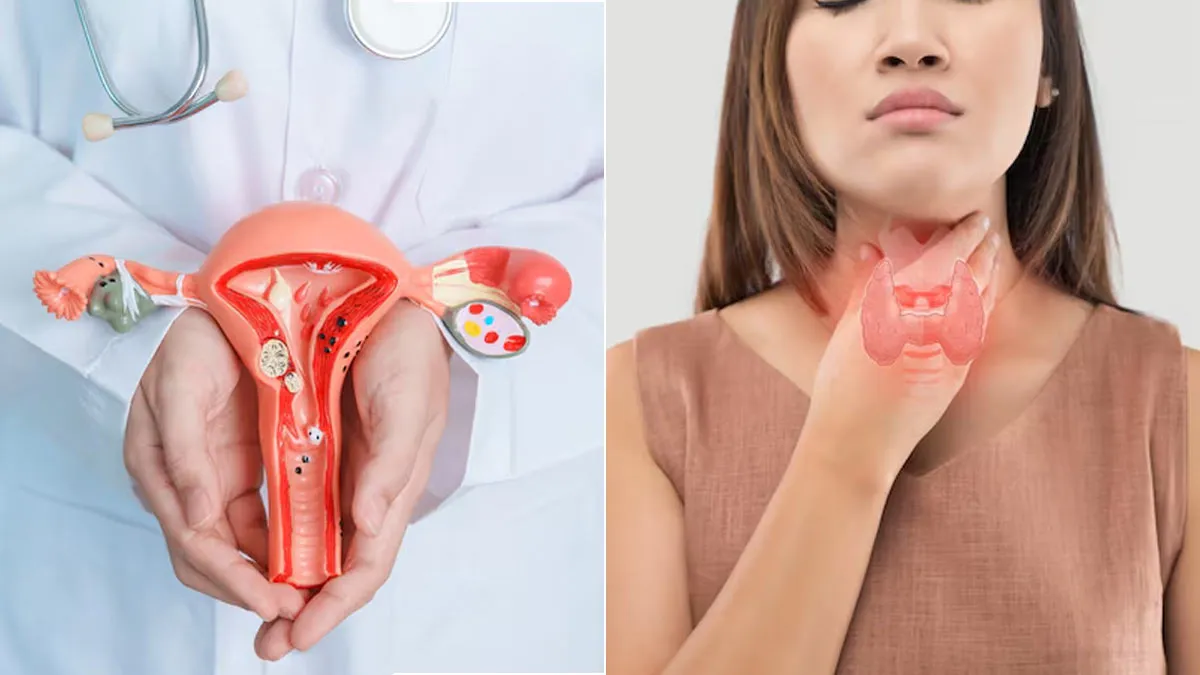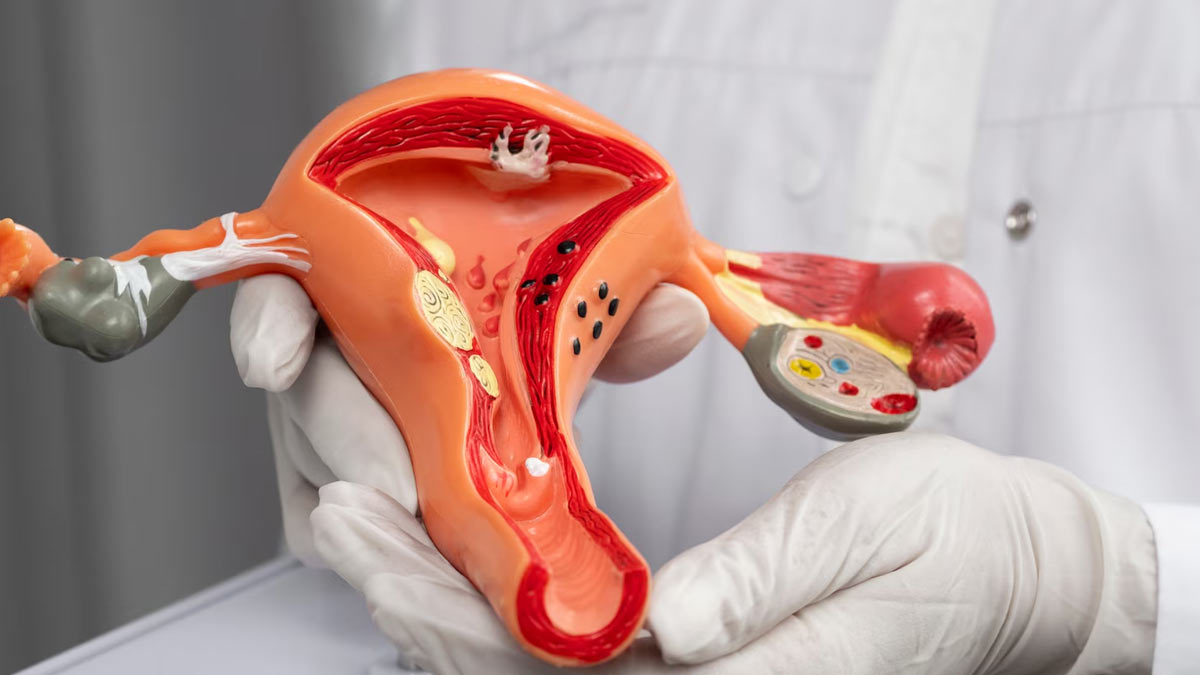
Cases of Polycystic Ovary Syndrome (PCOS) and thyroid disorders are on a sharp rise in Gen Z females. In the past few years, this has become a grave public health concern, immensely created due to today’s lifestyle, environmental factors, and genetics. These conditions are fundamentally hormonal and metabolic, hence they are increasingly prevalent in younger women facing unique pressures.
Table of Content:-
To understand why women, particularly Gen Z women, are more at risk of PCOS and Thyroid issues, the Onlymyhealth editorial team spoke to Dr. Narendra BS, Lead Consultant – Endocrinology & Diabetology, Aster Whitefield hospital, and Dr Archana Batra, Dietitian with over 15 years of experience.
Why Gen Z Women Are More Prone To PCOS
According to the World Health Organisation (WHO), PCOS, a common hormonal condition, affects women of reproductive age. It has become the most common health problem and a leading cause of infertility. Dr Nadendra BS explained, “Gen Z women are facing a higher risk of PCOS due to a combination of modern lifestyle habits such as increased screen time, irregular sleep cycles, processed food consumption, and sedentary routines. Even environmental factors are increasingly contributing to disrupted hormonal balance and metabolism.”
Dr Archana Batra highlights how the accelerated onset of insulin resistance is one of the major causes of PCOS in Gen Z women. “High levels of insulin directly signal the ovaries to make an excess of androgens, or male hormones, which cause classic symptoms of PCOS such as irregular periods and acne,” she stated.
Also Read: Can Women Get PCOS After Having Kids? Expert Tells
Rise of Thyroid Cases In Gen Z Women
According to a report published in the Indian Journal of Endocrinology and Metabolism, one out of every eight young women had thyroid dysfunction, and mild TSH elevation was the most common abnormality.
Dr Batra spoke about how a combination of environmental and inflammatory triggers is behind the thyroid cases in young females. She stated, “In the environment, there is an increased level of exposure to endocrine-disrupting chemicals normally found in plastics, and some personal care products which interfere with the production and regulation of thyroid hormones.”
However, according to Dr Narendra BS, both thyroid disorders, hypothyroidism (underactive thyroid) and hyperthyroidism (overactive thyroid), are becoming common in young women due to stress, poor diet, iodine deficiency or excess, and increased autoimmune conditions. He also stated that constant digital exposure and disrupted sleep cycles severely impact the body’s metabolism and hormonal rhythm.
Connection Between PCOS and Thyroid Disorders
PCOS and thyroid disorders often coexist because both are related to endocrine system dysfunction. Dr Narendra BS said, “Women with hypothyroidism have a higher chance of developing PCOS due to altered metabolism, insulin resistance, and increased prolactin levels. Autoimmune thyroiditis (Hashimoto’s disease) is more common in women with PCOS, which clearly represents a link between inflammation and hormonal imbalance.”
He also shared that both conditions may cause issues like menstrual irregularities, infertility, and weight gain in women.
Also Read: Why PCOS Is More Than A Fertility Disorder - How It Contributes To Diabetes, Obesity, and Anxiety?
Contribution of Modern Lifestyle to Thyroid And PCOS
During the discussion, Dr Batra and Dr Narendra BS both shared that the current generation lives in a fast-paced and exhausting lifestyle, which is resulting in the rise of PCOS and thyroid cases. Dr Batra Further explained the contributing factors:
Sedentary lifestyle: Reduced physical activity is impacting metabolism and insulin sensitivity in the body, making Gen Z more prone to getting PCOS and thyroid issues.
Unhealthy Diet: Processed food, sugary beverages, and irregular meals are spiking insulin levels and hormonal disturbances.
Stress and Poor Sleep: Chronic stress and lack of quality sleep upset the hypothalamic-pituitary axis, which controls both ovarian and thyroid hormones in women.
Excess Screen Time: With the technological advancement, these days, mobile phones are not only the blue light exposure. Smart gadgets like watches, fitness bands, and even wifi lights are impacting the sleep cycle. These digital screens affect melatonin production and disrupt the hormonal cycles of women.
Tips To Manage PCOS and Thyroid In Gen Z Women
There is no cure for PCOS, but treatments can improve symptoms, as reported by the World Health Organisation (WHO). The same applies to thyroid disorders, which can be managed but not completely cured. Dr Batra and Dr Narendra BS suggested making a few lifestyle changes and other tips to deal with PCOS and Thyroid disorders in young females:
Balanced Diet: Doctors advise including whole grains, fresh fruits, vegetables, lean proteins, and omega-3-rich foods in the daily diet. Avoiding refined sugars and processed snacks, especially in the evening, will help you manage sugar levels.
Regular Exercise: Engaging in at least 30 to 45 minutes of physical activity, such as walking, yoga, strength training, or dancing, five days a week, is the most necessary task and works wonders for health.
Sleep Hygiene: Doctors suggest maintaining a consistent sleep schedule and reducing screen exposure before bedtime to maintain your natural sleep cycle.
Stress Management: With a hectic lifestyle, stress and anxiety have become persistent even in young people’s lives. However, practicing mindfulness, deep breathing, and meditation helps in managing depression and stress disorders.
Routine Health Check-Ups: Get your hormone, thyroid, and insulin levels tested regularly, so even if any condition occurs, you can be diagnosed and treated without any delay.
Medical Supervision: If symptoms persist even for a slightly longer period, visit your regular doctor. Follow his prescribed medications for thyroid and hormonal regulation.-1763387952399.jpg)
Bottom Line
PCOS and Thyroid disorders have become common in India, particularly in Gen Z women. These health conditions not only impact your daily routine but can also be the cause of severe future health problems. The best way to avoid these is to have a healthy and stress-free lifestyle, as prevention is always better than a cure.
Also watch this video
FAQ
What is it like having PCOS?
Individuals with PCOS experience symptoms such as severe pain during periods, irregular menstrual cycles, increased facial hair, sudden acne, and Obesity.Does PCOS go away on its own?
No, PCOS does not go away on its own and currently has no cure. However, its symptoms can be managed effectively through lifestyle changes and medications.Is thyroid a serious problem?
Yes, thyroid can turn into a serious health concern if left untreated, affecting several body parts, especially in women.
How we keep this article up to date:
We work with experts and keep a close eye on the latest in health and wellness. Whenever there is a new research or helpful information, we update our articles with accurate and useful advice.
Current Version
Nov 17, 2025 19:30 IST
Published By : Sameeksha Sharma
